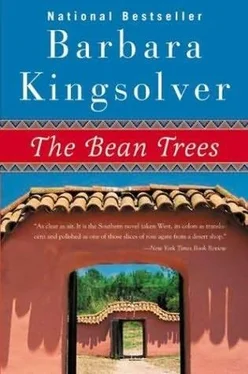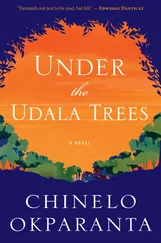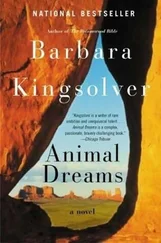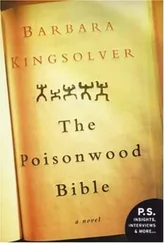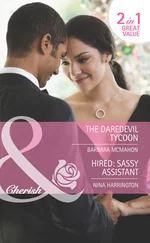Barbara Kingsolver - The Bean Trees
Здесь есть возможность читать онлайн «Barbara Kingsolver - The Bean Trees» весь текст электронной книги совершенно бесплатно (целиком полную версию без сокращений). В некоторых случаях можно слушать аудио, скачать через торрент в формате fb2 и присутствует краткое содержание. Жанр: Современная проза, на английском языке. Описание произведения, (предисловие) а так же отзывы посетителей доступны на портале библиотеки ЛибКат.
- Название:The Bean Trees
- Автор:
- Жанр:
- Год:неизвестен
- ISBN:нет данных
- Рейтинг книги:5 / 5. Голосов: 1
-
Избранное:Добавить в избранное
- Отзывы:
-
Ваша оценка:
- 100
- 1
- 2
- 3
- 4
- 5
The Bean Trees: краткое содержание, описание и аннотация
Предлагаем к чтению аннотацию, описание, краткое содержание или предисловие (зависит от того, что написал сам автор книги «The Bean Trees»). Если вы не нашли необходимую информацию о книге — напишите в комментариях, мы постараемся отыскать её.
“A LIVELY NOVEL… AN EASY BOOK TO ENJOY.”-The New Yorker
“LOVELY, FUNNY, TOUCHING AND HUMANE.”-Kirkus Reviews
“A SPIRITED, WARM BOOK, WRY AND AT THE SAME TIME REFRESHINGLY GUILELESS.”-Ella Leffland
***
Taylor Green becomes the guardian of an abandoned baby girl she calls Turtle. In Tucson they meet the proprietor of an auto-repair shop with a safe-house for Central American refugees upstairs and there she builds a life for herself and her child.
The Bean Trees — читать онлайн бесплатно полную книгу (весь текст) целиком
Ниже представлен текст книги, разбитый по страницам. Система сохранения места последней прочитанной страницы, позволяет с удобством читать онлайн бесплатно книгу «The Bean Trees», без необходимости каждый раз заново искать на чём Вы остановились. Поставьте закладку, и сможете в любой момент перейти на страницу, на которой закончили чтение.
Интервал:
Закладка:
But there was no steering Mattie off her course. She was positive I’d be a natural at tires. She chatted with me and Turtle between customers, and then sent us on our way with a grocery bag full of cabbage and peas, saying, “Just think about it, hon. Put it in your swing-it-till-Monday basket.”
When Mattie said she’d throw in two new tires and would show me how to fix my ignition, I knew I’d be a fool to say no. She paid twice as much as the Burger Derby, and of course there was no ridiculous outfit to be dry-cleaned. If I was going to get blown up, at least it would be in normal clothes.
In many ways it was a perfect arrangement. You couldn’t ask for better than Mattie. She was patient and kind and let me bring Turtle in with me when I needed to. Lou Ann kept her some days, but if she had to go out shopping or to the doctor, one baby was two hands full. I felt a little badly about foisting her off on Lou Ann at all, but she insisted that Turtle was so little trouble she often forgot she was there. “She doesn’t even hardly wet her diapers,” Lou Ann said. It was true. Turtle’s main goal in life, other than hanging on to things, seemed to be to pass unnoticed.
Matties place was always hopping. She was right about people always passing through, and not just customers, either. There was another whole set of people who spoke Spanish and lived with her upstairs for various lengths of time. I asked her about them once, and she asked me something like had I ever heard of a sanctuary.
I remembered my gas-station travel brochures. “Sure,” I said. “It’s a place they set aside for birds, where nobody’s allowed to shoot them.”
“That’s right. They’ve got them for people too.” This was all she was inclined to say on the subject.
Usually the people were brought and taken away by the blue-jeans priest in the station wagon I’d seen that first day. He also wore an interesting belt buckle, not with a scorpion but with an engraving of a small stick figure lost in a kind of puzzle. Mattie said it was an Indian symbol of life: the man in the maze. The priest was short, with a muscular build and white-blond, unruly hair, not really my type but handsome in a just-rolled-out-of-bed kind of way, though I suppose that saying such things about a priest must be some special category of sin. His name was Father William.
When Mattie introduced us I said, “Pleased to meet you,” making an effort not to look at his belt buckle. What had popped into my head was “You are old, Father William.” Now where did that come from? He was hardly old, and even if he were, this isn’t something you’d say.
He and Mattie went to the back of the shop to discuss something over coffee and pie while I held down the fort. It came to me a little later while I was testing a stack of old whitewalls, dunking them in the water and marking a yellow chalk circle around each leak. I remembered three drawings of a little round man: first standing on his head, then balancing an eel straight up on his nose, then kicking a boy downstairs. “You Are Old, Father William” was a poem in a book I’d had as a child. It had crayon scribbles on some pages, so it must have been a donation from one of Mama’s people whose children had grown up. Only a rich child would be allowed to scribble in a hardback book.
I decided that after work I would go down to one of Sandi’s New To You toy stores and find a book for Turtle. New To You was just like Mama’s people, only you had more choice about what you got.
After I had marked all the tires I rolled them across the lot and stacked them into leaky and good piles. I congratulated myself on my steady hand, but later in the day Mattie saw me jump when some hotdog Chevy backfired out in the street. She was with a customer, but later she came over and said she’d been meaning to ask what I was always so jumpy about. I thought of that column in Reader’s Digest where you write in and tell your most embarrassing moment. Those were all cute: “The Day My Retriever Puppy Retrieved the Neighbor’s Lingerie Off the Clothes Line.” In real life, your most embarrassing moment is the last thing in the world you would want printed in Reader’s Digest .
“Nothing,” I said.
We stood for a minute with our hands folded into our armpits. Matties gray bangs were more salt than they were pepper, cut high and straight across, and her skin always looked a little sunburned. The wrinkles around her eyes reminded me of her Tony Lama boots.
Mattie was like a rock in the road. You could stare at her till the cows came home, but it wouldn’t budge the fact of her one inch.
“Just don’t tell me you’re running from the law,” she said finally. “I’ve got enough of that on my hands.”
“No.” I wondered what exactly she meant by that. Out on the street a boy coasted by on a bicycle, his elbow clamped over a large framed picture of a sportscar. “I have a fear of exploding tires,” I said.
“Well, of all things,” she said.
“I know. I didn’t ever tell you because it sounds chickenshit.” I stopped to consider if you ought to say “chickenshit” in a place called Jesus Is Lord’s, but then the damage was done. “Really it’s not like it sounds. I don’t think there’s a thing you could name that I’m afraid of, other than that.”
“Of all things,” she said again. I imagined that she was looking at me the way you do when you first notice someone is deformed. In sixth grade we had a new teacher for three weeks before we realized his left hand was missing. He always kept his hanky over it. We’d just thought it was allergies.
“Come over here a minute,” Mattie said. “I’ll show you something.” I followed her across the lot. She took a five-gallon jerry can, the type that Jeeps have strapped on their backs, and filled it a little better than halfway up with water.
“Whoa!” I said. While I wasn’t paying attention she’d thrown the heavy can at me. I caught it, though it came near to bowling me over.
“Knocked the wind out of you, but it didn’t kill you, right?”
“Right,” I said.
“That’s twenty-eight pounds of water. Twenty-eight pounds of air is about what you put in a tire. When it hits you, that’s what it feels like.”
“If you say so,” I said. “But I saw a guy get blown up in the air once by a tire. All the way over the Standard Oil sign. It was a tractor tire.”
“Well that’s another whole can of beans,” Mattie said. “If we get a tractor tire in here, I’ll handle it.”
I had never thought of tire explosions in relative terms, though it stood to reason that some would be worse than others. By no means did this put my fears to rest, but still I felt better somehow. What the hell. Live free or bust.
“Okay,” I said. “We’ll handle it together, how’s that?”
“That’s a deal, hon.”
“Can I put this down now?”
“Sure, put it down.” She said it in a serious way, as if the can of water were some important damaged auto part we’d been discussing. I blessed Matties soul for never laughing at any point in this conversation. “Better yet,” she said, “pour it out on those sweet peas.”
There was a whole set of things I didn’t understand about plants, such as why hadn’t the sweet peas been killed by the frost? The same boy sped by again on his bike, or possibly a different boy. This time he had a bunch of roses in a white paper funnel tucked under his arm. While the water glugged out over the sweet peas I noticed Mattie looking at me with her arms crossed. Just watching. I missed Mama so much my chest hurt.
Turtle had managed to get through her whole life without a book, I suppose, and then had two of them bought for her in one day. I got her one called Old MacDonald Had an Apartment House, which showed pictures of Old MacDonald growing celery in windowboxes and broccoli in the bathtub and carrots under the living-room rug. Old MacDonald’s downstairs neighbors could see the carrots popping down through the ceiling. I bought it because it reminded me of Mattie, and because it had stiff pages that I hoped might stand up to Turtle’s blood-out-of-turnips grip.
Читать дальшеИнтервал:
Закладка:
Похожие книги на «The Bean Trees»
Представляем Вашему вниманию похожие книги на «The Bean Trees» списком для выбора. Мы отобрали схожую по названию и смыслу литературу в надежде предоставить читателям больше вариантов отыскать новые, интересные, ещё непрочитанные произведения.
Обсуждение, отзывы о книге «The Bean Trees» и просто собственные мнения читателей. Оставьте ваши комментарии, напишите, что Вы думаете о произведении, его смысле или главных героях. Укажите что конкретно понравилось, а что нет, и почему Вы так считаете.
